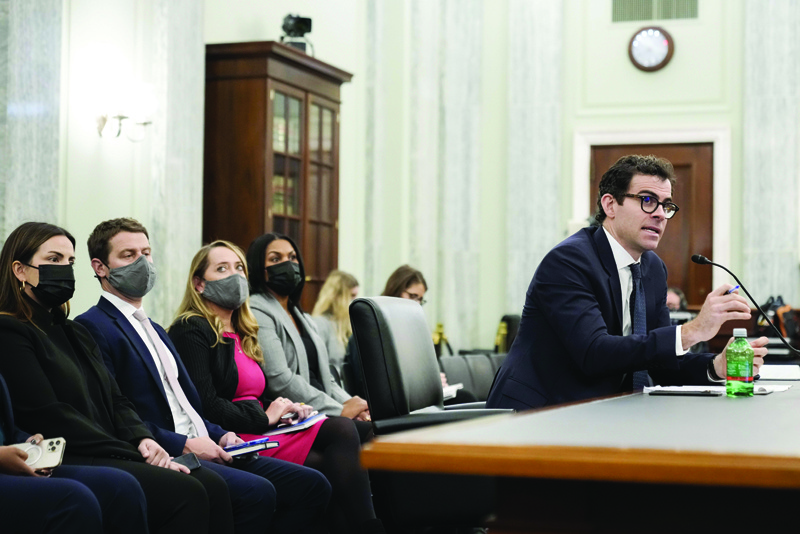 WASHINGTON: Head of Instagram Adam Mosseri testifies during a Senate Commerce, Science, and Transportation Committee hearing titled Protecting Kids Online: Instagram and Reforms for Young Users on Capitol Hill. - AFP
WASHINGTON: Head of Instagram Adam Mosseri testifies during a Senate Commerce, Science, and Transportation Committee hearing titled Protecting Kids Online: Instagram and Reforms for Young Users on Capitol Hill. - AFP
PARIS: Facebook misidentified tens of thousands of advertisements flagged under its political ads policy, according to a study released yesterday, which warned that the failure could lead to political manipulation. Researchers at Belgium's KU Leuven university and New York University examined 33.8 million Facebook ads that ran on the social media site between July 2020 and February 2021.
"This is the first known study to quantify the performance of Facebook's political ad policy enforcement system at a large and representative scale," the team said in a summary of their findings. Facebook imposes stricter conditions on paid advertisements that concern "social issues, elections or politics," including posts that promote particular candidates. Ads labeled as political appear on the site with a disclaimer that explains who paid for them. Ads that are found to be political, when they were not declared as such, are taken down.
But the researchers found that in 189,000 cases when Facebook reviewed an ad to check whether or not it should be treated as political, it was wrong 83 percent of the time. These included 117,000 cases when Facebook's detection system failed to flag up ads that should have been treated as political, and 40,000 ads that were mistakenly flagged as political when they were not. The researchers noted that Facebook's enforcement of the policy relies heavily on detecting keywords in ads under an automated system, although staff also play a role in moderating the content.
The period studied included elections in two large Facebook markets, the US and Brazil, and the researchers warned that mislabeling the ads created opportunities for manipulation. "When Facebook fails to identify advertisers who do not properly declare their ads as political, those who are malicious can spread disinformation," they warned. "Users who see ads without a political disclaimer may not be aware that their intent is to influence them," they added.
The team noted that the US social media giant missed a higher proportion of undeclared political ads outside the United States. "The platform had the worst record in Malaysia, where it missed as much as 45 percent of ads from obviously political pages or advertisers," the research summary said. "In Macedonia, Argentina, Turkey, Portugal, France and Serbia, Facebook missed up to one out of four ads from such pages, which were sponsored by candidates or parties."
The study follows criticism of Facebook over a recent whistleblower scandal, including accusations that the site's ability to tamp down hate speech and misinformation has been seriously lacking outside the West. Within the US, Facebook introduced a moratorium on political ads around the 2020 presidential election, following deep controversy over the platform's role leading up to the 2016 election of Donald Trump. Facebook nonetheless allowed more than 70,000 political ads to run during the 2020 moratorium, the researchers found. AFP has reached out to Facebook to request a comment on the study.
Instagram impact on kids
In another development, Instagram's boss faces a grilling Wednesday from US lawmakers after damning press reports based on leaked internal research showed the photo-sharing app could harm its young users. Adam Mosseri's testimony comes as the social media networks under Facebook parent Meta battle a crisis sparked by the company's own documents, and which have rekindled a years-old US push for regulation.
The documents leaked to reporters, lawmakers and regulators by Facebook whistleblower Frances Haugen include research from 2019 that found Instagram makes body image issues worse for one in three teenage girls. Another report, from 2020, revealed that 32 percent of teenage girls said that when they felt bad about their bodies, Instagram made it worse. Facebook has pushed back fiercely against a string of Wall Street Journal reports based on the findings, and a subsequent series for a US media consortium, arguing its research was mischaracterized.
Senators Richard Blumenthal and Marsha Blackburn are leading the hearing, the latest in a series probing how social media could be making teens feel worse about themselves. "My conversations with parents have deeply moved me to fight for... reforms and demand answers that the whole nation is seeking," Blumenthal said Tuesday. Facebook has bounced back from other scandals like the one involving Cambridge Analytica, a British consulting firm that used the personal data of millions of Facebook users to target political ads.
In that case, CEO Mark Zuckerberg went to Washington to apologize and the company agreed to a $5 billion settlement with US regulators. However, the leading social media network faces at least one investigation spurred by the latest crisis: a consortium of US states announced in November a probe of Meta's techniques for enticing young users and the potential resulting harms. On the eve of Wednesday's hearing before a Senate commerce subcommittee, Instagram announced new protections for young users like suggesting a break if they have been spending a lot of time on the platform.
The timing of the announcement drew a wary reception from lawmakers, who questioned whether it was an effort at distraction ahead of the hearing. Stephen Balkam, founder and CEO of advocacy group Family Online Safety Institute, said pre-hearing announcements are a Washington tradition but noted they won't make the app's problems go away. "Instagram is safer than it was. I think Instagram is less toxic for teens than it was. But it will never be perfect, it will never be fully safe. But then that's true of all social media," he said. - AFP
.jpg)



